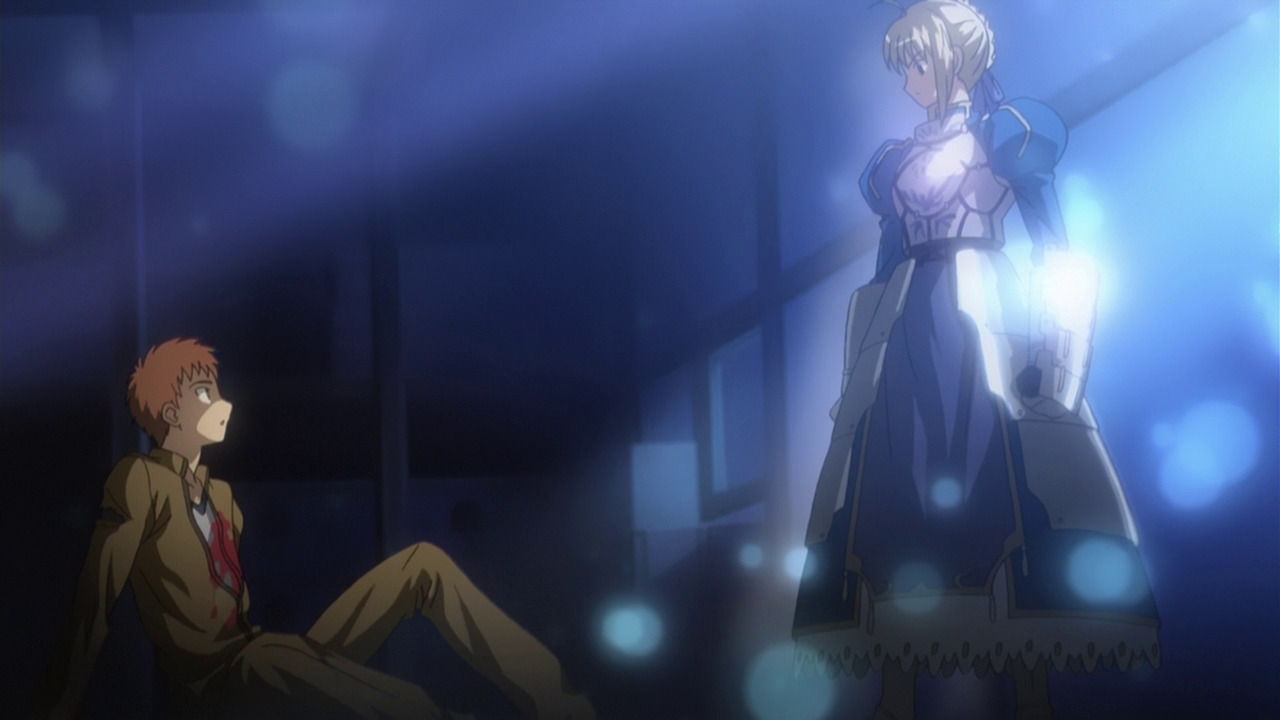Adaptations of visual novels to anime are something of a mixed bag. Sometimes, like with Clannad and Comic Party, the adaptation is a hit. Other times, it doesn’t work quite so much. Fate/Stay Night falls into the former case, though there are times where the work stumbles in its execution, primarily on the animation front, though there are some narrative issues.
The series follows Shirou Emiya, an 18-year old high school student, approaching graduation, and planning to join the JSDF in order to fulfill his childhood dream of being a “hero of justice”. As with most rom-com heroes, he has a female childhood friend who is something of a Yamato Nadeshiko archetype – Sakura Matou. He has some slight magic ability that allows him to recognize faults in electronic components and, to a degree, mend them. However, life has other plans in mind for him – as while the setup of the series might imply that this is a harem comedy, the game’s source material is quite the opposite.
Instead, Shirou has been selected to be one of the masters in the Holy Grail War, a tournament held among mages to determine who is worthy to make a wish from the Holy Grail – each Master summoning a servant from through time who fits various classes – Caster (can cast spells on their own), Assassin (sneaky bastards), Archer (Range attacks), Rider (can summon a mount for improved mobility), Lancer (uses a spear), and Saber (uses a sword). Shirou ends up getting drug into this without knowing what he’s getting into, and purely (it seems) by accident summoning the Servant Saber – and in particular the figure of King Arthur, or rather Arturia Pendragon (the real King Arthur being a woman who passed herself off as a man after drawing the sword from the stone).
Shirou forms an alliance with one of his classmates, Rin Tohsaka, who is a more accomplished magus, and another participant in the tournament, who has drawn Archer – whose identity is a unknown even to her. Shirou learns that the incident that left him orphaned as a child (and lead to him being adopted by another magus), was the result of the previous Holy Grail War. In order to prevent a similar incident from happening to others, and in the hopes of using his wish to become a true hero of justice, he and Saber decide to win the Grail War.
The animation for the series is done by Studio DEEN, and this is made during their dark period, after their high points back in the 80s with works like Angel’s Egg, and before their modern redemption with Konosuba and Showa Genroku Rakugo Shinjuu. This leads to some weird animation moments – such as clear moments where dialog scenes are taken off camera, to avoid having to animating mouth movements. Some of the action scenes also feel under-animated – including some of the shows more significant fights – like Archer’s battle with Berserker. It feels like a deliberate attempt to save money on the animation budget so they can go all out in the series finale, which has an incredibly dramatic animation bump – so dramatic that it almost feels like it was animated by a completely different studio.
That said, the show’s music is generally good, with a score composed by Kenji Kawai, who is known for his work on Ghost in the Shell – though the scope of the music feels, once again, limited by budget – as if he envisioned the music to be played by live musicians, only to be informed that all they could afford was a really nice synthesizer, loaded with some really good MIDI voices.
The writing is generally good. The women, particularly Saber, Rin, Taiga, and Ilya are all very interestingly and entertainingly written characters, with some great character moments. In particular, Miki Itou as Taiga livens up every scene she’s in with the work, and you can almost feel her energy liven up the rest of the cast in the scenes she shares with them. That said, some of the writing around the character of Shirou stumbles. He’s overly patronizing of Saber. In particular, early in the series he’s unwilling to acknowledge or recognize her combat skills to a real degree – choosing to fight instead of her even when it’s been demonstrated to him that she is far better with a sword than pretty much everyone. Later in the series he shows a better degree of trust, but it is still frustrating early on in the show.
Later on in the series the show develops a twist that comes more or less out of nowhere, but it introduces one of the show’s better antagonists, so I’ll cut them some slack for that.
As far as whether you should watch the show – Ufotable has spent more time in this universe than Deen has, with prequel Fate/Zero, and the Unlimited Blade Works anime (which adapts another route through the same game). Fate/Zero sets up the rules of the Grail War, much as this does, but Fate/Zero front-loads the exposition with a massive infodump in the first, double-length episode, while this show paces the exposition better – and explains some other concepts that Fate/Zero doesn’t get into (like how the magic system works).


Pingback: Video Game Review: Aquapazza Dream Match | Breaking it all Down